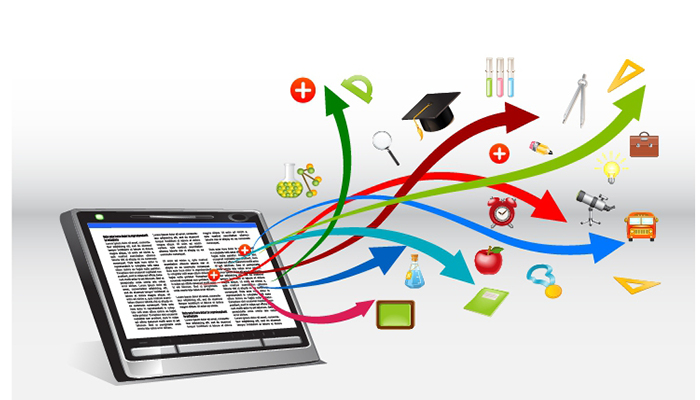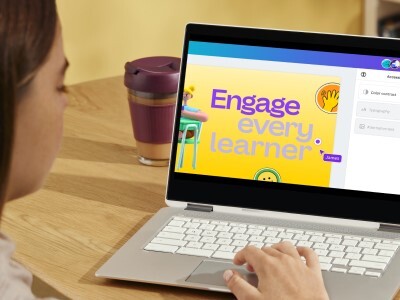Technology Tools
K-12 Roundup of Tools and Resources: Digital Content
Topics

Educators often take advantage of educational technologies as they make the shifts in instruction, teacher roles, and learning experiences that next gen learning requires. Technology should not lead the design of learning, but when educators use it to personalize and enrich learning, it has the potential to accelerate mastery of critical content and skills by all students.
Practitioner's Guide to Next Gen Learning
Ever wonder which math and ELA digital content your peers rely upon? I did! I scoured each of our NGLC grantees’ profiles and compiled a comprehensive list of digital content by grade cluster with a breakdown by school.
Ever wonder which math and ELA digital content your peers rely upon? I did! I scoured each of our NGLC grantees’ profiles and compiled a comprehensive list of digital content by grade cluster with a breakdown by school.
This week’s Practitioner's Guide to Next Gen Learning provides a snapshot of the digital content in use in NGLC schools! Dig in.
Achieve 3000 - ELA and Science for grades 2-12. Achieve3000 is a web-based tool for supporting reading comprehension and proficiency in writing. Aligned to the Common Core, Achieve3000 supports differentiated instruction using Lexiles as the foundation. Students read the nonfiction text and follow a daily five-step literacy routine. Achieve 3000 is used in about 11 of our grantee schools, and seems to be most popular at the 5-12 grade levels.
Cost: $10,000-$13,000 for 250 students. Includes setup and training.
ALEKS - Assessment and Learning in Knowledge Spaces (ALEKS) is a web-based learning system with a range of full courses in math (and Science) for K-12. The courses for grades 3-12 are correlated with state and Common Core Standards. Placement in courses begins with an assessment and adaptive instruction follows. ALEKS Math is employed in about seven grantee schools and is used across the K-12 span.
Cost: $40 per student per year.
Apex Learning - ELA, Science, and Math for grades 9-12. Apex Learning’s high school classes include courses for remediation in math, reading, and writing geared toward students who are reading below grade level. Apex Learning also has honors courses for students to accelerate their learning. Apex Learning is used in about five grantee schools at the 9-12 grade levels.
Cost: $150 to $400 per enrolled student.
BrainPop - ELA, Science, and Math for grades K-12. BrainPop is a subscription resource for animated, curriculum-based supplemental content or “movies.” BrainPop is currently used in about five grantee schools at the K-12 grade levels. (You might also check out BrainPops Game Up for fun, easy to use games focused on Social Studies for grades 4-8. BrainPops Game Up is free.)
Cost: $99 for home use and up to $2,000 for school use. Custom contracts are available.
Discovery Education - ELA and Math for grades K-12. Discovery Education offers over 9,000 full-length online streaming educational videos segmented into 71,000 content-specific clips tied directly to state and national standards that can be incorporated into the existing curriculum. Discovery Education is used in about five grantee schools at the 5-12 grade levels.
Cost: Limited free for individual use. $2,750 per year per school for K-8 schools and $3,095 per year per building for high schools.
i-Ready - ELA and Math for grades K-8. i-Ready is an adaptive assessment and instruction platform to help differentiate instruction for elementary and middle school students. The diagnostic program screens students and helps place them in response to intervention (RtI) tiers based on an assessment of needs down to the sub-skill level. The adaptive assessment platform varies questions based on student responses. Based on the diagnostic report, i-Ready develops a custom combination of instructional materials for each student. Lessons use real-world scenarios to teach foundational concepts and guided practice helps to reinforce understanding. i-Ready is used in about seven grantee schools and is used across K-12 grade levels.
Cost: $29 per student for one content area, $58 per student for both content areas.
Khan Academy - Math and Science (as well as other select areas) for grades K-12. Khan Academy aims to provide a “free world-class education for anyone anywhere.” The cornerstone of this web-based tool is its collection of more than 3,000 videos covering K-12 math and select topics in science, history, business, art history, and test preparation. Eighteen of our grantee schools use Khan Academy; this tool seems to be most popular at the 6-12 grade levels.
Cost: Free.
Reading Plus - Reading instruction for students in grades 3-12. Reading Plus begins with an assessment that measures a student’s reading capacity as well as his or her reading efficiency and motivation for reading. The program has been created for students who have foundational reading skills (phonemic awareness, phonics, and decoding) in place but are either inefficient or lack comprehension and vocabulary skills, or both, to be effective, motivated readers. Dynamically adjusting instructional components scaffold comprehension. Students have choice and control as they learn and as they demonstrate mastery, subsequent selections have richer academic vocabulary, higher word counts, and deeper examination of topics and themes. The program provides personalized scaffolds to students who require support. About five grantee schools use Reading Plus and it seems to be most popular at the 6-12 grade levels.
Cost: $65 a seat for 1-99 seats; $45 a seat for 200 or more or unlimited access ($3,500 for a small school to $23,000 for a large school - 1,500 students or more).
ST Math - Math for grades K-5 and intervention for middle and high schoolers. ST Math is a series of online math programs best used as a supplement to classroom instruction. There are currently five offerings:
- ST Math: K-5 (covering key concepts)
- ST Math: Fluency (quick retrieval of basic math facts)
- ST Math: Math+Music K-5
- ST Math: Secondary Intervention (for middle and high school students who are multiple grade levels behind)
- Algebra Readiness (a full year course, complete with textbook and CD)
ST Math is used in about 10 grantee schools and seems to be most popular at the K-8 grade levels.
Cost: Prices are negotiable, but the cost to schools averages $100 per student for the first year.
Looking for other high-quality digital content options? Check out the resources below.
Blog Series: Puzzle_Ed - Andrew Jeong of Match Education writes blog reviews of the content and other tools they are using in Match Next. Read Software Review: Cram (versus Anki) to learn how Cram stacks up against Anki.
EdTech Index: EdSurge compiles a “community-driven database” of edtech products. Check out the full database for information on edtech products in the following categories:
- Curriculum Products
- Teacher Needs
- School Operations
- Post-Secondary
- Everything else
KnowledgeBase Resource: Digital Content: Best of the Web 2015 - This document contains 124 high-quality online content resources. Grouped by content area and organized by grade level and resource type. For each resource, there is a brief product overview, as well as other information including costs, platform, and a link to the resource’s website.
This and all other KnowledgeBase resources are available to you via the NGLC Exchange, our online platform for networking, collaboration, learning, and resource sharing. Need credentials to access the Exchange? Please fill out this short form.
How do you decide which digital content to use with your students? Our grantees are interested in why schools make the selections they make...why Apex over i-Ready? And they are interested in the strengths and weakness of the digital content in use.
We’d love to hear your thoughts! Let us know in the comments below or tweet your reply to @NextGenLC #digitaltools




